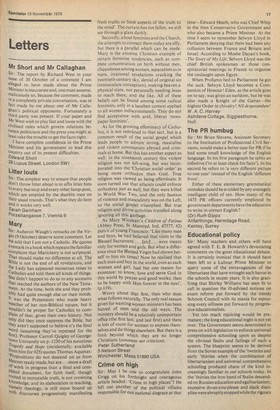Mary
Sir: Auberon Waugh's remarks on the Virgm (9 October) deserve some comment. Let Me add that I am not a Catholic. He quotes a remark in a book which repeats the familiar Complaint that Mariolatry is not scriptural. That should make no difference at all. The Bible is not the end of all revelations, and the Lady has appeared numerous times to Catholics and told them all kinds of things. She didn't happen to do so in any accounts that reached the authors of the New Testament. At the time, both she and they probtIblY had quite enough else on their minds. It was the Protestants who made heavy weather of her non-Biblical nature, but it Wouldn't be proper for Catholics to comPlain of that, given their own history. Not Only did they once suppress the Bible, but they aren't supposed to believe it's the final word (assuming they've repented for the first). Professor Carroll Quigley of Georgetown University on p. 1230 of his notorious Tragedy and Hope (incidentally, available from him for 825) quotes Thomas Aquinas: Propositions do not descend on us from Heaven ready made, but are... more a draft or work in progress than a final and completed document, for faith itself, though rooted in immutable truth, is not crowning knowledge, and its elaboration in teaching, namely theology, is still more bound up With discourses progressively manifesting
fresh truths or fresh aspects of the truth to the mind'. The curtain has not fallen, we still see through a glass darkly.
Secondly, about feminists and the Church, the attempts to connect them today are silly, but there is a parallel which can be made. Mary is the extreme Christian example of certain feminine tendencies, such as complete concentration on birth without men, cliquishness among women, separatism as in nuns, irrational revelations cracking the twentieth-century sky, denial of original sin (immaculate conception), making heaven a physical state, not personally needing Jesus to reach there, and the like. All of these beliefs can be found among some radical feminists, only in a heathen context applied to all women indiscriminately. They do not find acceptance with arid, liberal 'newspaper feminists'.
As for the growing effeminacy of Catholics, it is not restricted to that sect, but is a common result of the social gospel which leads people to admire strong, masculine and violent communists abroad and criminals at home. But this has another aspect as well : in the nineteenth century this violent religion was not left-wing, but was incorporated into the 'Christian social order' as being more orthodox than God. True religion was viewed as being effeminate. It soon turned out that atheists could enforce orthodoxy just as well, but they were killed in World War Two, and the only bastion of violence and masculinity was on the Left, so the social gospel triumphed. But true religion and divine activities trundled along ignoring all this garbage.
As Mary Windeatt's Children of Fatima (Abbey Press, St Meinrad, Ind. 47577, 82) puts it of young Francisco: `Like many men and boys, he had believed that visits to the Blessed Sacrament . . . [etc] . . . were meant only for women and girls. But what a difference since the Blessed Virgin had shown herself to him six times! Now he realised that each man and boy in the world, even as each woman and girl, had but one reason for existence: to know, love and serve God in this world by prayer and good works, then to be happy with Him forever in the next', (p.119).
Worry about that first, then who does what follows naturally. The only real reason given for wanting women ministers has been hatred of men and the old ways. The ministry should be a relatively unimportant office (the first last, and last first) and there is lots of room for women to express themselves and do things elsewhere. But there is a limit beyond which they are no longer Christians (comment not criticism).
Peter Sutherland 5 Nelson Street Winchester, Mass 01890 USA


































 Previous page
Previous page